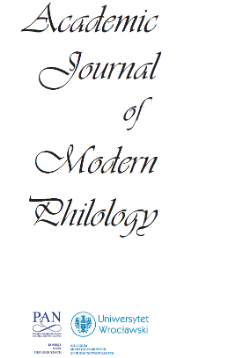Metaphor Saves
Metaphor Saves
Author(s): Tomasz Paweł KrzeszowskiSubject(s): Christian Theology and Religion, Language studies, Language and Literature Studies, Philology, Translation Studies
Published by: Komisja Nauk Filologicznych Oddziału Polskiej Akademii Nauk we Wrocławiu
Keywords: Bible; conceptual metaphors; senses; corruption of language
Summary/Abstract: What is said about metaphor in the present paper will mainly concern the Christian Bible as directly or indirectly translated from the original languages (mostly Ancient Hebrew and New Testament Greek). However, unless otherwise indicated, all biblical quotations are based on New International Version of the Bible. Metaphor is conceived as a cognitive-conceptual device rather than a merely rhetorical ornament, which is consistent with basic tenets of cognitive linguistics. Among conceptual metaphors the metaphor MENTAL REALITY IS PHYSICAL REALITY stands out as one of the most productive metaphors as it generalizes the cognitive process of creating and understanding abstract concepts in terms of concrete, physical entities. The subject of religious thinking, contemplation and discourse cannot be experienced through senses, because such things are “What no eye has seen, what no ear has heard, and what no human mind has conceived” (1 Corinthians 2:9). Thus, metaphor is a kind of hyper-sense allowing us to perceive what our senses cannot perceive in all domains of our knowledge. According to the New Testament Christ himself explained to his disciples why he used parables (i.e. metaphors) in his teachings (Matthew 13:10-13). Conceptual metaphors appearing in the Bible are like a kind of a road, or a kind of a bridge, or a kind of a ladder—all leading man to God. The corruption of language connected with the original sin and manifested in using language as an instrument of deception and lying rather as an instrument of communication with God, was overcome by Jesus Christ as the Word (Logos) offered by God to annihilate the consequences of the original sin. As Christ saved Man from sin and death, metaphor frees language from its corruption, which is also a consequence of the original sin. Understood as the hyper-sense metaphor allows man to re-establish and maintain contact with God. Metaphor will not be needed when we see things as they really are. We shall also see God as He really is.
Journal: Academic Journal of Modern Philology
- Issue Year: 2019
- Issue No: 8
- Page Range: 139-148
- Page Count: 10
- Language: English

